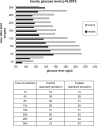Intensive perioperative glucose control does not improve outcomes of patients submitted to open-heart surgery: a randomized controlled trial
- PMID: 19142552
- PMCID: PMC2671976
- DOI: 10.1590/s1807-59322009000100010
Intensive perioperative glucose control does not improve outcomes of patients submitted to open-heart surgery: a randomized controlled trial
Abstract
Background: The objective of this study was to investigate the relationship between different target levels of glucose and the clinical outcomes of patients undergoing cardiac surgery with cardiopulmonary bypass.
Methods: We designed a prospective study in a university hospital where 109 consecutive patients were enrolled during a six-month period. All patients were scheduled for open-heart surgery requiring cardiopulmonary bypass. Patients were randomly allocated into two groups. One group consisted of 55 patients and had a target glucose level of 80-130 mg/dl, while the other contained 54 patients and had a target glucose level of 160-200 mg/dl. These parameters were controlled during surgery and for 36 hours after surgery in the intensive care unit. Primary outcomes were clinical outcomes, including time of mechanical ventilation, length of stay in the intensive care unit, infection, hypoglycemia, renal or neurological dysfunction, blood transfusion and length of stay in the hospital. The secondary outcome was a combined end-point (mortality at 30 days, infection or length of stay in the intensive care unit of more than 3 days). A p-value of <0.05 was considered significant.
Results: The anthropometric and clinical characteristics of the patients from each group were similar, except for weight and body mass index. The mean glucose level during the protocol period was 126.69 mg/dl in the treated group and 168.21 mg/dl in the control group (p<0.0016). There were no differences between groups regarding clinical outcomes, including the duration of mechanical ventilation, length of stay in the intensive care unit, blood transfusion, postoperative infection, hypoglycemic event, neurological dysfunction or 30-day mortality (p>0.05).
Conclusions: In 109 patients undergoing cardiac surgery with cardiopulmonary bypass, both protocols of glycemic control in an intraoperative setting and in the intensive care unit were found to be safe, easily achieved and not to differentially affect clinical outcomes.
Trial registration: ClinicalTrials.gov NCT00370643.
Figures
References
-
- Kernan WN, Viscoli CM, Inzucchi SE, Brass LM, Dawn M, Shulman GI. Prevalence of abnormal glucose tolerance following a transient ischemic attack or ischemic stroke. Arch Intern Med. 2005;165:227–3. - PubMed
-
- Dora B, Mihci E, Eser A, Ozclenir C, Caker M, Balaci MK. Prolonged hyperglycemia in the early subacute period after cerebral infarction: effects on short term prognosis. Acta Neurol Belg. 2004;104:64–7. - PubMed
-
- Alvarez-Sabin J, Molina CA, Ribo M, Arenillas JF, Montaner J, Huertas R. Impact of admission hyperglycemia on stroke outcome after thrombolysis: risk stratification in relation to time to reperfusion. Stroke. 2004;35:2493–8. - PubMed
-
- Williams LS, Rotich J, Qi R, Fineberg A, Espay A, Bruno S. Effects of admission hyperglycemia on mortality and costs in acute ischemic stroke. Neurology. 2002;59:67–7. - PubMed
-
- Capes SE, Hunt D, Malmberg K, Pathak P, Gerstein HC. Stress hyperglycemia and prognosis of stroke in nondiabetic and diabetic patients: a systematic overview. Stroke. 2001;32:2426–32. - PubMed
Publication types
MeSH terms
Substances
Associated data
LinkOut - more resources
Full Text Sources
Medical


